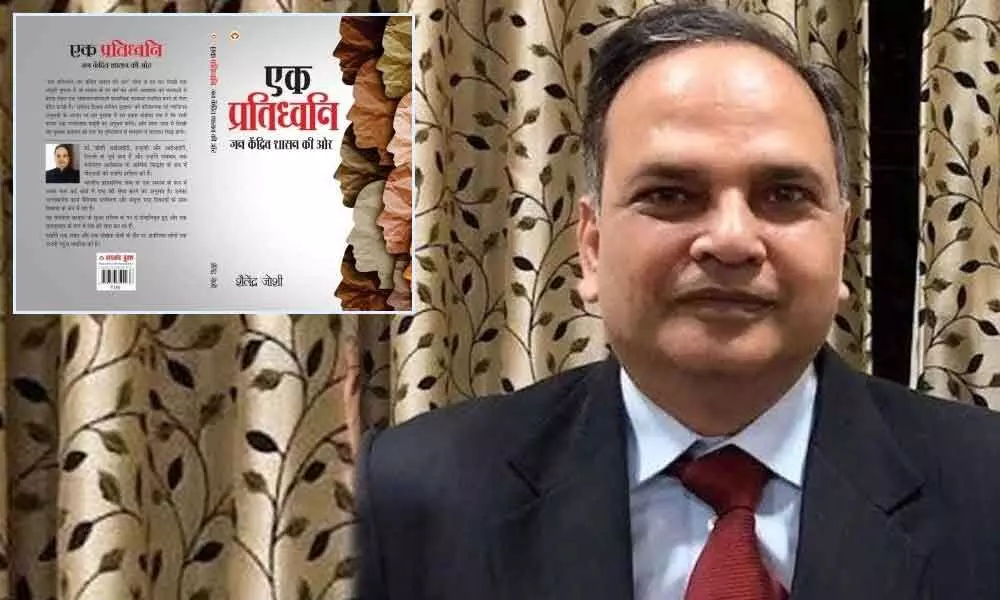Live
- The Economic Impact of Medical Tourism: Opportunities and Challenges for Countries
- CPM Politburo Member B.V. Raghavulu Criticizes "One Nation-One Election" Concept
- India Secures Third Place at Dubai Car Racing: Actor Ajith's Team Shines
- Centre to unveil 40 livestock projects worth over Rs 545 crore
- Corporate leaders have ‘gone into silliness’: Sanjeev Sanyal on work-hour debate
- ‘Nalla Jilakara Mogga’ from ‘Garividi Lakshmi’ gains appreciation
- ‘Daaku Maharaaj’ team celebrates success
- Rashmika gets injured, takes off from work
- Satish Neenasamtakes on a new role in multilingual film ‘The Rise of Ashoka’
- Chandrababu heads to hometown Naravari palle to celebrate Sankranti
Just In
Hyderabad: Need for responsive public grievance redressal says SK Joshi


Need for responsive public grievance redressal says SK Joshi
When I joined the service, public grievance system was much stronger and robust then without social media.After four decades, I mean media spread is there, you can raise your concerns. But the solution, the systematic resolution of problems, I'm yet to see. Resolution of problems is not commensurate with the kind of issues which common man deliberates. So, we have to come out with a system which is responsive to the needs of the people, their requirements, their complaints. That is missing. Despite your social media revolution and whatever you call it –S K Joshi
Punjagutta: Barely a year after superannuating as the fourth Chief Secretary of India's youngest State, Shailendra Kumar Joshi has come out with his first Hindi book titled 'EkPratidhwani Jan KendritShaasanki Ore'.
The book, to be launched soon, offers his reflections on governance gleaned from his years as a civil servant in the Government of India, AP and finally Telangana.
Curiously, Joshi's association with the Telugu States goes back to his childhood days in Bareilly (UP) when a career in the Indian Civil Services was a far-fetched idea. Offered the choice of Urdu, Sanskrit and Telugu as his third language in junior high school, he opted for Telugu.
His childhood tryst with the language stood him in good stead when he was selected as an IAS officer and got allotted to AP cadre. Upon the State's bifurcation, he went on to serve in the fledgling Telangana, retiring as its CS in 2019.
Through the book, he aims to bring the focus of governance firmly onto people's problems and issues. He said that the idea behind the book is to encourage discourse among the stakeholders at all levels. By leveraging his experiences as a civil servant, he dwells upon a multitude of issues and problems that weigh upon the minds of boththe people who rule and those they rule.
"The gap between rulers and ruled is increasing over a period of time. Basically, I have selected several topics, and relevant issues are raised, like, for example, cooperatives. Once upon a time it was very successful movement.
Then, since last two decades nobody talks about them. The cooperative movement per se is a robust model of development. But its impact gradually diminished the way it was implemented.
"In order to revive cooperatives, we have to correct implementation model. It's again going to become a powerful tool for development. Similarly, education, health policy, water, different topics, have been briefly touched upon to raise the curiosity of the readers and encourage debate and discussion on the topic," Joshi says.
Interestingly, the book also contains a chapter penned by the author's wife Anuradha Joshi. Titled 'Mere Nazariye Se', the article describes the journey of an IAS officer from a spouse's perspective.
Comprising around 90 articles in all, 'EkPratidhwani Jan KendritShaasanki Ore' explores the idea of establishing good governance from three perspectives---individuals, institutions and processes. Joshi postulates that all these three factors are essential building blocks in a robust good governance framework.
Joshi's previous publications include 'Management of Transboundary Water Resources' and 'Echo T Calling'. 'EkPratidhwani Jan KendritShaasanki Ore' is the first book he has authored in Hindi. Dipping into his experiences as a bureaucrat,, he attempts to get the readers to don their thinking caps and try to unravel many of the issues and problems that vex us as a society and a nation.
Joshi is firm in his belief that modern-day conveniences like, social media, are not effective replacements for solid public grievance redressal systems that seem to have taken a back seat for some time now.
"Point is very clear. Social media interaction is like an off-the-cuff kind of interaction. If you send hundreds or thousands of tweets, one tweet will be picked up by the people and relevant action will be taken by the relevant authorities.
When I joined the service, public grievance system was much stronger and robust then without social media.After four decades, I mean media spread is there, you can raise your concerns. But the solution, the systematic resolution of problems, I'm yet to see.
Resolution of problems are not commensurate with the kind of issues which common man deliberates. So, we have to come out with a system which is responsive to the needs of the people, their requirements, their complaints. That is missing. Despite your social media revolution and whatever you call it."

© 2025 Hyderabad Media House Limited/The Hans India. All rights reserved. Powered by hocalwire.com






